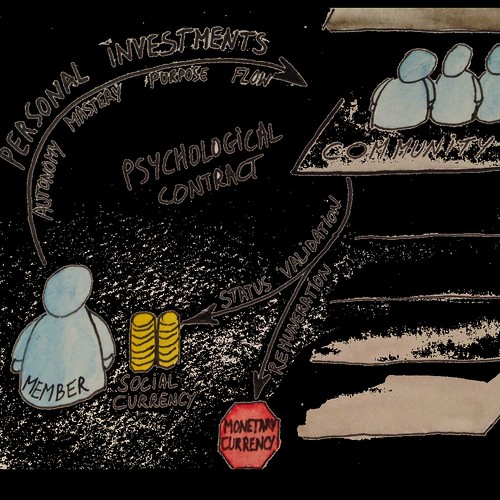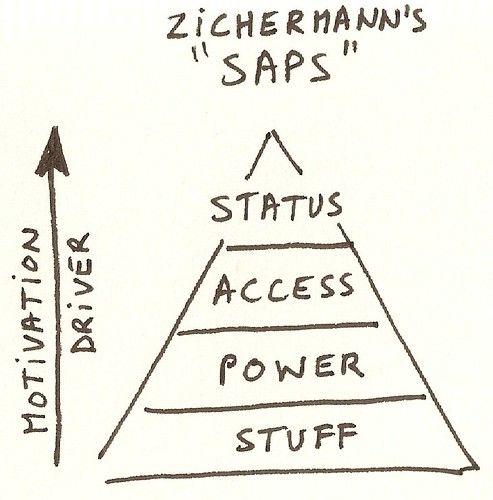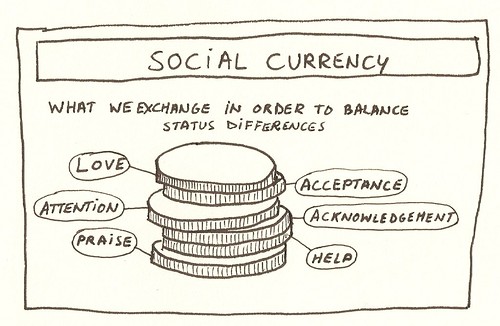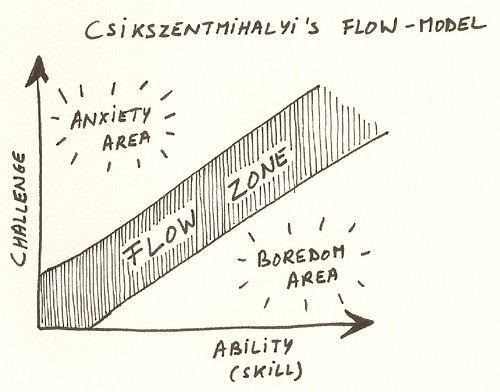In this article we take a closer look at the personal investment loop that strengthens the feeling of membership.
Members go the extra mile of doing personal investments in a community if they get rewarded with what is most valuable to them: the social currency that increases their status. But the contribution itself should be challenging enough to be worth the investment.
The feeling of membership is an important component of Sense of Community. Membership is the feeling of belonging to a group because one has invested a part of oneself in order to become a member. We earn membership through personal investment and at the same time personal investment makes membership more valuable.
For example: The amount of vulnerability that a person is prepared to share (i.e.: a personal investment) with other members and the extent to which one is open to the emotional pain from the community determines the sense of belonging and identification.
‘Investment’ and not ‘Expense’
Members contribute time, emotions, efforts and sometimes financial means. As a result of that contribution, their membership becomes more valuable and meaningful. That is why we use the term ‘investment’. Without getting hooked up in financial language, it is important to articulate the difference between an investment and an expense. The difference is in the expected return.
- An expense involves spending money that delivers a direct benefit.
- It covers the cost of something you want to purchase.
- The value of an expense is fixed and there are no further expectations.
- A delivery or fulfillment closes the loop of the transaction.
- An investment involves spending money that creates more value over time.
- It covers the cost of something that will hopefully bring a return.
- The value of an investment is uncertain and expected to be higher in the future.
- An investment opens a loop of events that will hopefully return a higher value than the initial spending.
The Expected Return: SAPS
Members will only stay and invest more when the return on their investments is positive. Else they will move on to a different community that better satisfies their needs. But what do we know about the expected return on a personal investment of emotion, time and effort?
There is a parallel universe of lose-knit communities that has developed over the past 30 years. It’s the world of online games. The field of expertise that has developed around the online gaming world, is known under the term ‘gamification’. Gamification-guru Gabe Zichermann tells us that “It is the process of using game thinking and game mechanics to engage users and solve problems”. It is worth taking a closer look at the learnings from that field, because gaming dynamics and the corresponding engagement mechanics focus on community engagement.
Zichermann uses a concept that reflects the most craved rewards in the gaming world. The acronym SAPS stands for ‘Status – Access – Power – Stuff’. These rewards – in exactly that order – describe the expected returns of the personal investments of a gamer into a community:
- Status refers to the various levels or ranks to which players can aspire to belong. Aspiring and collecting miles to reach the next level (silver, gold, platinum,…) of a sky-miles program of an airline is an application of status as a reward and it turns out to work very well in terms of customer loyalty.
- Access refers to opportunities that allow players to interact in a private or special way with and organization or service. For example, allowing select players to view content before others, or to enter an exclusive contest.
- Power refers to special entitlements or rank that allow top players to be in positions of superiority over others. For example, a highly ranked player who, based on his/her title, can donate virtual goods to help newer players in their quests.
- Stuff refers to tangible prizes given to players on completing quests or challenges. Zichermann identifies stuff as the least motivating of all four options because the effects of stuff in terms of loyalty and engagement are very short-lived. Imagine a contest for a free i-Pad: this only leads to a transactional exchange of “what do I need to do to win it?” and no later engagement or loyalty whatsoever. Yet… it seems to be a very common form of reward among marketers.
Status, Access and Power are the most important rewards for making lasting personal investments into a community. As we have seen the previous post, status is ultimately about influence and dignity. If members can earn more dignity in the community through their personal investments, they will be most likely to stay and to make more of those investments.
Case in Point: Stack Overflow
Stack Overflow is one of the largest digital question and answer sites. All of Stack Overflow’s content is created voluntarily by its members. More than 5,000 questions are posted and answered daily. It is fascinating to see how users are engaged in answering questions. At some point the site’s creators even had to put usage limitations in place for fear of creating exploitive addictions. According to Jeff Atwood, the co-founder of the company, part of the reason is the following:
“Social rewards of doing something other people find important.”
Here we can see the SAPS mechanic in action:
- Status: The company implemented a points system with an mechanism for earning certain rights on the site.
- Access: The most valued users with the most ‘social points’ are running the site.
- Power: Top contributors have editing privileges and can even ban other users.
According to Atwood, the most important aspect of Stack Overflow-points is that they reflect peer status. Contributors are uncertain of how many points they will accrue by answering a question. The only way to find out is to write the best possible response and hope the community values your contribution. Uncertain and future-oriented… this is what we referred to earlier as characteristic of an investment versus an expense. Points are a way to earn a higher status on the site, but that status is only attained through an exchange of social currency that determines who is most valued by the community. According to Atwood, this is completely different from an arbitrary algorithm intended to control the user.
“Reputational status conferred by the community has real value, while badges or points given by a machine have only temporary benefits”.
The Currency of the Reward Matters
The SAPS model is very illustrative to demonstrate that ‘stuff’ has almost the reverse effect on rewarding personal investments. If your most honest and authentic contributions are rewarded with monetary rewards instead of appreciation and acknowledgment of the community, how authentic will your next contribution be? If at all you are still willing to contribute? Stephen Covey used the metaphor of a financial bank account into which you can make deposits and take withdrawals. The currency of this bank account is social currency, so its statements tell us something about the relationship you have with your friends, family, associates, customers, etc. The most important of all deposits into the emotional bank account is empathy. Covey’s definition of empathy:
Empathy is listening to another person within his or her frame of reference.
In other words: if you pay attention and show your interest you are building the relationship and making deposits on that account. In his 2010 book Linchpin, Seth Godin refers to these deposits as ’emotional labor’, i.e.: that part of your work where you make a connection and a difference for the recipient of your work.
When contributions of members are rewarded with acknowledgment and appreciation of other members, it is as if social currency is invested on the emotional bank account of that member. But when contributions of members are rewarded with monetary rewards, no social currency is invested. The value of the exchange is downgraded to an expense and the transaction is over.
Monetary rewards (Stuff) make use of another currency that is not redeemable in terms of Sense of Community. They erode the personal investment to the level of an expense and this will eventually bring the loop to a halt.
In his 1993 book The Empty Raincoat, Charles Handy refers to this as the Paradox of Productivity; i.e.: by converting unpriced work into priced work we make it measurable. On first sight the economy seems to grow, but by doing so we have reduced it to part that is financially measurable and we have destroyed the social value of the work itself.
The loop of personal investments therefore largely depends on the currency of the rewards. Status, Access and Power are rewards that are exchanged in social currencies and those can be invested on the emotional bank account.
The Threshold of the Investment Matters
So now that we know that only social currency keeps the loop going, let’s have a look at how we can get members in the loop in the first place. In other words: How can we make it easier for people to make a first contribution?
First of all there is evidence that suggests that there is a threshold for contributing and that its size seems to matter. In 1966 the researchers Freedman and Fraser found that people were more likely to agree about a bigger request when asked for a small one first. When they asked to put a “Drive Carefully” sign into people’s garden, only 17% agreed. However, when these people were asked to put a smaller sign “Be a Safe Driver” first and then, after 2 weeks, they were asked to place a big “Drive Carefully” sign, 76% of them agreed.
This goes to show that every commitment – how small and insignificant it may seem – makes the next commitment more than 4 times more likely. So it makes sense to pay attention to the size of the initial engagement we ask members to “step up” to.
A second way to lower the threshold for members to start contributing is by making it socially safer for them to do so. As we discussed in the previous post, community roles are a perfect way to do this. A role grants permission to members for taking certain initiatives.
But hang on, because when the thresholds get too low, there is no attraction anymore!
The Investment is the Reward
The threshold to contributing should still be an challenge that is worth the investment. To understand what the best level of challenge is for people to engage in an initiative, we need to understand that the mechanism of monetary rewards and the mechanism of social recognition only cover half of the story. Motivation research shows us that the investment is a motivator in itself.
The author Daniel Pink covered this very well in his book Drive. According to Pink there are three factors that determine lasting engagement, they are:
- Autonomy: the need to direct our own lives;
- Mastery: the desire to learn and create new things;
- Purpose: being in service of something that is larger than oneself
And there is more evidence point in the direction of the motivating effect of the investment itself. In a recent article of Harvard Business Review, Teresa Amabile and Steven Kramer point out that what really motivates people is the sense of making progress.
As for recognition, the social currency that is redeemable on the emotional bank account of members, the same study revealed that it does indeed motivate. “But”, as the researchers continue:
“there will be nothing to recognize if people aren’t genuinely moving forward—and as a practical matter, recognition can’t happen every day. You can, however, see that progress happens every day.”
Their idea of progress as a prime motivator for making a personal investment can also be found in the thinking of positive psychologist Mihaly Csikszentmihalyi as he conducted research on the conditions that are necessary to be in flow.
He found that regardless of our cultural background or education there are seven universal conditions that seem to be present when a person is in flow:
- Focus: to be completely involved in what we are doing.
- Ecstasy: A sense of of being outside of everyday reality.
- Clarity: Knowing what needs to be done and how well we are doing.
- Ability: Knowing that the activity is doable and that our skills are adequate to do the task.
- Serenity: a feeling of growing beyond the boundaries of oneself.
- Timelessness: focused on the present; hours seem to pass by in minutes.
- Intrinsic motivation: whatever produced flow becomes its own reward.
Bringing it all Together: the Psychological Contract
It turns out that personal investments into a community are about the social rewards of doing something other people find important. These investments are about the anticipation of status validation, not immediate gratification. We also found that rewards are just half the story, because a personal investment can be a virtue in itself when it gives members a sense autonomy, mastery, purpose and flow.

The loop of personal investments therefore depicts the psychological contract between a member and a community.
- On one hand, we see members searching for challenging initiatives to invest their time, emotions and efforts into. They seek autonomy, mastery, purpose and flow.
- Next, we see that the only currency that results into an investment on the emotional bank account of a member is social currency; i.e.: the kind of currency that builds status.
Such a psychological contract is how we are attached to each community-layer we belong to. Our sense of membership and belonging is determined by how well a community can match all of these needs.








